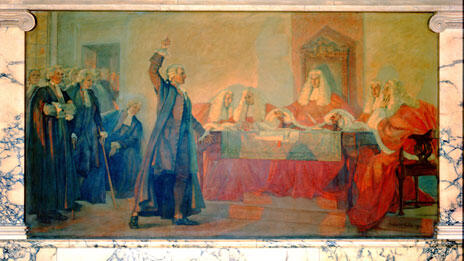- Trial Court Law Libraries

Article 14 (1780)
Every subject has a right to be secure from all unreasonable searches, and seizures, of his person, his houses, his papers, and all his possessions. All warrants, therefore, are contrary to this right, if the cause or foundation of them be not previously supported by oath or affirmation; and if the order in the warrant to a civil officer, to make search in suspected places, or to arrest one or more suspected persons, or to seize their property, be not accompanied with a special designation of the persons or objects of search, arrest, or seizure: and no warrant ought to be issued but in cases, and with the formalities prescribed by the laws.
Precedents and Quotations
John Adams, “Adams’ ‘Abstract of the Argument’”, Boston Superior Court, February 1761, Massachusetts Historical Society, Adams Papers Digital Edition, Legal Papers of John Adams, volume 2:
"[Mr. James Otis for the Inhabitants of Boston:] I was desired by one of the court to look into the books, and consider the question now before the court, concerning Writs of Assistance. . . It appears to me (may it please your honours) [these Writs of Assistance are] the worst instrument of arbitrary power, the most destructive of English liberty, and the fundamental principles of the constitution, that ever was found in an English law-book. [S]pecial writs may be granted on oath and probable suspicion. . . [A]n officer should show probable grounds, should take his oath on it, should do this before a magistrate, and that such magistrate, if he thinks proper should issue a special warrant to a constable to search the places. . . It is the business of this court to demolish this monster of oppression, and to tear into rags this remnant of Starchamber tyranny.”
Edward F. Hennessey, “The Extraordinary Massachusetts Constitution of 1780”, 14 Suffolk Law Review 873, 875-876 (1980):
“Of all the historical events relating to the law, surely none had greater influence upon John Adams and his contemporaries than the argument of James Otis in 1761 against the Writs of assistance. . . The fiery and courageous argument took place on February 24, 1761, in the upper chamber of the building we now know as the Old State House in Boston. Under the authority of acts of Parliament the King’s officers in the colony had begun to employ general search warrants not limited as to scope and time. Merchants of Salem and Boston applied to many lawyers and were accepted by Otis and a colleague, Mr. Thatcher. . . Adams [later] wrote, ‘But Otis was a flame of fire!-with a promptitude of classical allusions, a depth or research, a rapid summary of historical events and dates, a profusion of legal authorities, a prophetic glance of his eye into futurity , and a torrent of impetuous eloquence, he hurried away every thing before him. American independence was then and there born.’ The argument of Otis, of course, stated the community’s case for the later adoption of the Fourteenth Article of the Massachusetts Declaration of Rights against unreasonable searches.”
Section 10, Virginia Declaration of Rights, Adopted unanimously June 12, 1776, Virginia Convention of Delegates, drafted by Mr. George Mason:
“That general warrants, whereby any officer or messenger may be commanded to search suspected places without evidence of a fact committed, or to seize any person or persons not named, or whose offense is not particularly described and supported by evidence, are grievous and oppressive and ought not to be granted.”
Constitution of Pennsylvania, “A Declaration of the Rights of the Inhabitants of the Commonwealth or State of Pennsylvania”, Section X. September 28, 1776:
“That the people have a right to hold themselves, their houses, papers, and possessions free from search and seizure, and therefore warrants without oaths or affirmations first made, affording a sufficient foundation for them, and whereby any officer or messenger may be commanded or required to search suspected places, or to seize any person or persons, his or their property, not particularly described, are contrary to that right, and ought not to be granted.”
Robert Brink, from Social Law Library, has pointed out that while John Adams felt free to use words and ideas from other states’ contemporaneous constitutions, Adams also added his own refinements, often making the Massachusetts Constitution more memorable. Adams’ addition of the word “unreasonable” to “search and seizure” captured “the essence of the right in what has become a universally used and understood phrase.”
Massachusetts Historical Society, Adams Papers Digital Edition, volume 8, Papers of John Adams, “The Report of a Constitution or Form of Government for the Commonwealth of Massachusetts”, Footnote 24:
“JA’s Art. XV, now XIV, was modeled on Pennsylvania’s Art. X, but the word ‘unreasonable’ seems to be JA’s contribution.”
James Otis Arguing Against the Writs of Assistance in the Old Towne House
February 24, 1761, Mural by Robert Reid, 1901, Nurses’ Hall, State House, Boston

